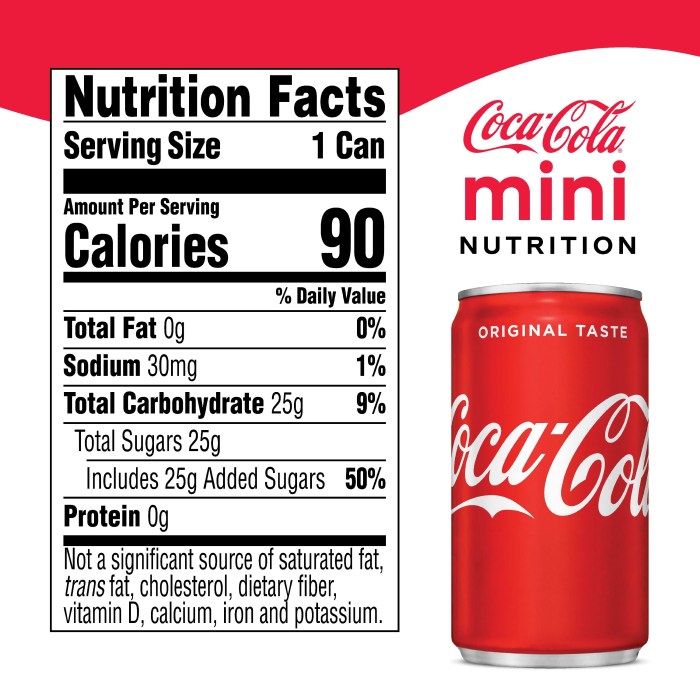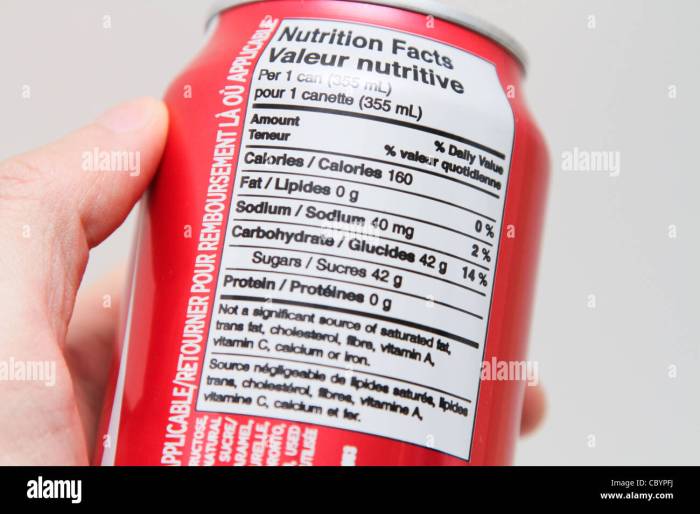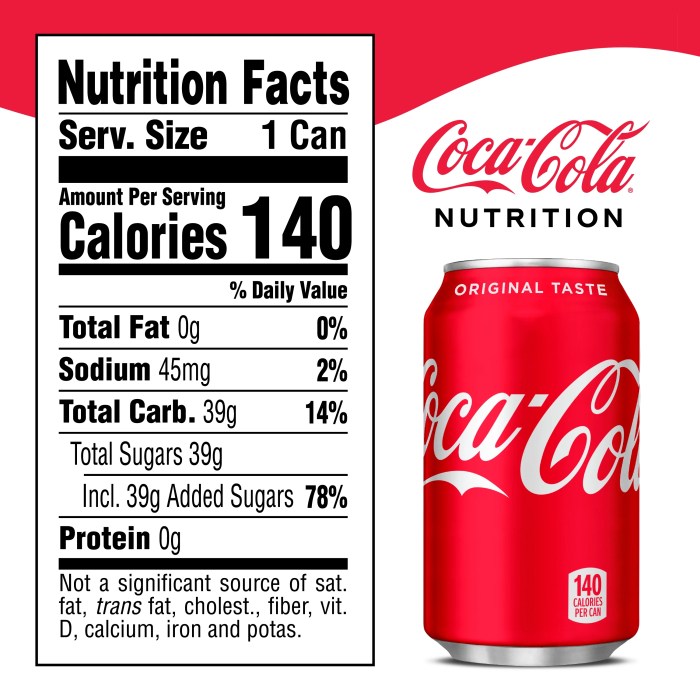Nutritional Content Breakdown
Coke can nutrition facts – Let’s dive into the specifics of what’s actually in that Coca-Cola can. Understanding the nutritional content is key to making informed choices about your beverage consumption. We’ll examine the typical nutritional information found on a label and discuss the implications of each component for your overall health.
Nutritional Information Table
The following table presents a typical nutritional breakdown for a 12-ounce can of Coca-Cola. Remember that these values can vary slightly depending on the manufacturing process and specific product. It’s always best to check the label on your specific can.
| Nutrient | Amount per Serving | % Daily Value | Unit of Measurement |
|---|---|---|---|
| Calories | 140 | – | kcal |
| Total Fat | 0g | 0% | g |
| Saturated Fat | 0g | 0% | g |
| Cholesterol | 0mg | 0% | mg |
| Sodium | 0mg | 0% | mg |
| Total Carbohydrate | 39g | 13% | g |
| Sugars | 39g | – | g |
| Protein | 0g | 0% | g |
| Vitamin D | 0mcg | 0% | mcg |
| Calcium | 0mg | 0% | mg |
| Iron | 0mg | 0% | mg |
| Potassium | 0mg | 0% | mg |
Significance of Nutrients in Coca-Cola
The primary components of Coca-Cola’s nutritional profile are calories and sugar. The high sugar content contributes significantly to the caloric value. Excessive sugar intake is linked to weight gain, increased risk of type 2 diabetes, heart disease, and dental problems. The absence of essential vitamins, minerals, and fiber means Coca-Cola provides minimal nutritional benefit.
Comparison to Other Carbonated Soft Drinks
Many other carbonated soft drinks share a similar nutritional profile to Coca-Cola, characterized by high sugar and calorie content and a lack of essential nutrients. Diet versions often substitute sugar with artificial sweeteners, which have their own set of ongoing debates regarding long-term health effects. While some variations might have slightly different sugar or calorie amounts, the overall pattern of minimal nutritional value remains consistent across most brands.
For example, a 12-ounce can of Pepsi typically contains a comparable amount of sugar and calories to Coca-Cola. Other sodas, like Sprite or 7 Up, may have slightly lower sugar content but still lack significant nutritional value.
The sugary whisper of a coke can’s nutrition facts, a fleeting dance on the tongue, contrasts sharply with the richer, denser reality. For a glimpse into a different kind of sweetness, explore the decadent details at nutrition facts nothing bundt cakes , a world of frosted delights. Returning to the crisp metallic tang of the coke can, we find its simple, stark nutritional profile a stark counterpoint to the cake’s opulent calories.
Serving Size and Consumption Patterns

A standard serving of Coca-Cola is typically considered to be one 12-ounce can or bottle. Understanding this serving size is crucial because it forms the basis for interpreting nutritional information and assessing potential health impacts. Consuming multiple servings significantly increases the intake of sugar, calories, and other components, potentially leading to various health consequences.
It’s important to note that Coca-Cola consumption patterns vary widely across different demographic groups. Factors like age, socioeconomic status, and cultural influences play a significant role in determining how much soda people drink. While precise, globally consistent data is difficult to obtain, general trends can be observed.
Average Coca-Cola Consumption Across Demographics
The following table presents estimated average weekly Coca-Cola consumption, acknowledging the limitations of readily available comprehensive data across diverse populations. These figures are approximations based on various studies and surveys, and regional variations are considerable.
| Demographic Group | Average Consumption (cans/week) | Age Range | Geographic Location (Example) |
|---|---|---|---|
| Young Adults (18-25) | 3-4 | 18-25 | United States (Urban Areas) |
| Adults (26-45) | 1-2 | 26-45 | United States (Suburban Areas) |
| Older Adults (46-65) | <1 | 46-65 | United States (Rural Areas) |
| Teenagers (13-17) | 2-3 | 13-17 | United States (National Average) |
Note: These figures are estimates and can vary significantly based on numerous factors. More precise data requires region-specific studies.
Health Risks Associated with Excessive Consumption
Excessive consumption of Coca-Cola, and sugary drinks in general, is linked to a number of significant health problems. The high sugar content contributes to weight gain and obesity, increasing the risk of type 2 diabetes, heart disease, and certain types of cancer. Furthermore, the acidic nature of the drink can erode tooth enamel, leading to dental problems. Regular consumption can also negatively impact bone health and increase the risk of metabolic syndrome.
For example, studies have shown a strong correlation between high soda consumption and an increased risk of developing type 2 diabetes, particularly in individuals already predisposed to the condition. The high fructose corn syrup found in many sodas is particularly implicated in this relationship.
Alternatives and Healthier Choices

Let’s face it, Coca-Cola, while undeniably delicious, isn’t exactly a health food. It’s packed with sugar and provides minimal nutritional value. Fortunately, there are plenty of tasty and much healthier alternatives available to quench your thirst and satisfy your cravings. Switching to these options can significantly improve your overall health and well-being.We’ll explore some excellent alternatives and compare their nutritional profiles to Coca-Cola, highlighting the benefits of making the switch.
Healthier Beverage Alternatives to Coca-Cola
Choosing healthier beverages is a simple yet impactful step towards a healthier lifestyle. Many delicious and refreshing options exist that are significantly lower in sugar and calories than Coca-Cola. These alternatives often offer added nutritional benefits, such as vitamins, minerals, and antioxidants.
| Beverage | Serving Size (oz) | Calories | Sugar (g) | Other Notable Nutrients |
|---|---|---|---|---|
| Coca-Cola | 12 | 140 | 39 | None of significant nutritional value |
| Water | 12 | 0 | 0 | Essential for bodily functions |
| Unsweetened Iced Tea | 12 | 0-20 (depending on brewing method) | 0-2 (depending on brewing method) | Antioxidants (depending on tea type) |
| Unsweetened Sparkling Water | 12 | 0 | 0 | Provides carbonation without added sugar |
| 100% Fruit Juice (small serving) | 4 | ~50 | ~12 | Vitamins and antioxidants, but should be consumed in moderation due to natural sugars |
Note: Nutritional values can vary depending on brand and specific product. This table provides approximate values for comparison purposes.
Benefits of Choosing Healthier Beverages, Coke can nutrition facts
Switching from sugary drinks like Coca-Cola to healthier alternatives offers numerous benefits. These range from improved weight management to a reduced risk of chronic diseases. The reduced sugar intake is a key factor in these improvements.The consistent consumption of sugary drinks is strongly linked to weight gain and obesity. Reducing sugar intake, through the choice of healthier beverages, contributes to better weight management and reduces the risk of associated health problems.
Furthermore, the decrease in added sugar intake significantly lowers the risk of developing type 2 diabetes, heart disease, and other chronic illnesses. Finally, increased hydration through water consumption supports better overall health and well-being.
Calorie Count and its Implications

A standard 12-ounce can of Coca-Cola contains approximately 140 calories. These calories come almost entirely from sugar, with minimal contribution from other nutrients. Understanding this calorie count is crucial for managing weight and overall health.The role of sugary drinks, like Coca-Cola, in weight management and overall health is significant and often negative. The calories in these beverages are considered “empty calories” because they provide energy without offering any significant nutritional value such as vitamins, minerals, or fiber.
This means that consuming sugary drinks contributes to your daily caloric intake without providing any satiety or nutritional benefits, making it easier to overconsume calories and gain weight. Furthermore, studies have linked high consumption of sugary drinks to an increased risk of various health problems, including type 2 diabetes, heart disease, and some types of cancer.
Calorie Impact on Daily Intake
Let’s look at some hypothetical scenarios to illustrate the impact of Coca-Cola consumption on daily caloric intake. Imagine a person aiming for a 2000-calorie daily diet. One can of Coca-Cola (140 calories) represents 7% of their daily caloric goal. Consuming two cans would increase this to 14%, significantly impacting their ability to stay within their target. If this person regularly consumes multiple sugary drinks daily, it quickly becomes challenging to maintain a healthy weight and balance their nutritional needs.
For example, a person who consumes three cans of Coca-Cola daily is adding an extra 420 calories to their diet – equivalent to a small meal. This excess intake, if not balanced with increased physical activity or reduced calorie intake elsewhere, could lead to weight gain over time. Consider a scenario where someone is already struggling with weight management.
Adding even one can of Coca-Cola daily could hinder their progress, potentially resulting in weight gain or preventing weight loss. This highlights the importance of mindful consumption of sugary drinks and their consideration within a balanced diet.
FAQ Overview: Coke Can Nutrition Facts
Does Coke contain artificial sweeteners?
No, standard Coca-Cola does not contain artificial sweeteners; its sweetness comes primarily from sugar.
What are the long-term effects of regular Coke consumption?
Regular consumption can contribute to weight gain, type 2 diabetes, tooth decay, and other health problems due to high sugar and calorie content.
Is diet Coke healthier than regular Coke?
Diet Coke is lower in calories and sugar, but it contains artificial sweeteners, the long-term effects of which are still being studied. Neither is a particularly healthy choice compared to water or unsweetened beverages.
How much caffeine is in a can of Coke?
The caffeine content varies slightly depending on the region, but it’s typically around 34mg per 12-ounce can.
